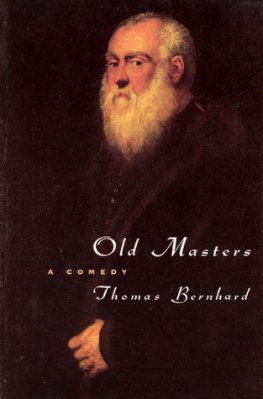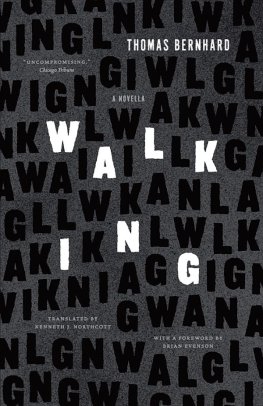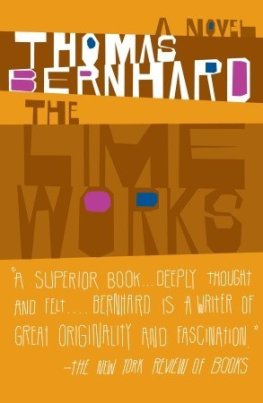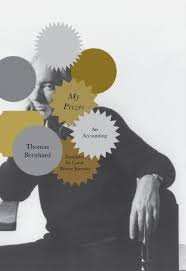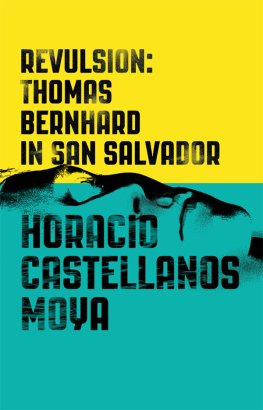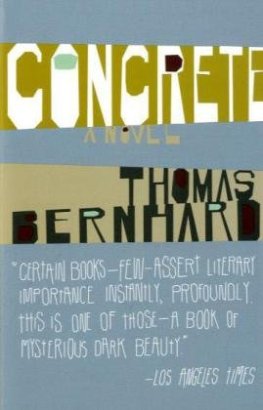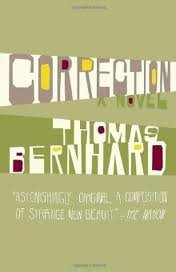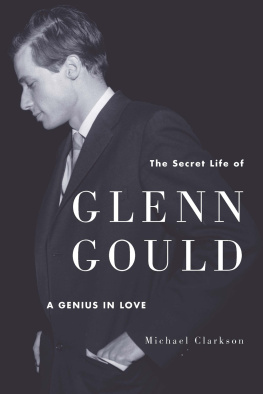For English-speaking readers approaching a novel by Thomas Bernhard for the first time, a word about his somewhat peculiar orthography and punctuation may be in order. Bernhards sentences are very long, even for a German reader accustomed to extended, complex sentence constructions. Further, the logical transitions between clauses (but, although, whereas) are often missing or contradictory, and the verb tenses are rarely in agreement. Bernhards frequent and unpredictable underlining also defies conventional usage. Sometimes he italicizes the title of Bachs compositions, sometimes he treats them like a common noun. On the other hand, he often gives the names of restaurants, towns, pianos, and people an emphasis that conventional German and English orthography exclude. These and similar oddities have been rigorously maintained in the present translation as the reflection of Bernhards characteristic voice.
J.D.
Suicide calculated well in advance, I thought, no spontaneous act of desperation.
Even Glenn Gould, our friend and the most important piano virtuoso of the century, only made it to the age of fifty-one, I thought to myself as I entered the inn.
Now of course he didnt kill himself like Wertheimer, but died, as they say, a natural death.
Four and a half months in New York and always the Goldberg Variations and the Art of the Fugue, four and a half months of Klavierexerzitien, as Glenn Gould always said only in German, I thought.
Exactly twenty-eight years ago we had lived in Leopoldskron and studied with Horowitz and we (at least Wertheimer and I, but of course not Glenn Gould) learned more from Horowitz during a completely rain-drenched summer than during eight previous years at the Mozarteum and the Vienna Academy. Horowitz rendered all our professors null and void. But these dreadful teachers had been necessary to understand Horowitz. For two and a half months it rained without stopping and we locked ourselves in our rooms in Leopoldskron and worked day and night, insomnia (Glenn Goulds) had become a necessary state for us, during the night we worked through what Horowitz had taught us the day before. We ate almost nothing and the whole time never had the backaches we habitually suffered from with our former teachers; with Horowitz the backaches disappeared because we were studying so intensely they couldnt appear. Once our course with Horowitz was over it was clear that Glenn was already a better piano player than Horowitz himself, and from that moment on Glenn was the most important piano virtuoso in the world for me, no matter how many piano players I heard from that moment on, none of them played like Glenn, even Rubinstein, whom Ive always loved, wasnt better. Wertheimer and I were equally good, even Wertheimer always said, Glenn is the best, even if we didnt yet dare to say that he was the best player of the century. When Glenn went back to Canada we had actually lost our Canadian friend, we didnt think wed ever see him again, he was so possessed by his art that we had to assume he couldnt continue in that state for very long and would soon die. But two years after wed studied together under Horowitz Glenn came to the Salzburg Festival to play the Goldberg Variations, which two years previously he had practiced with us day and night at the Mozarteum and had rehearsed again and again. After the concert the papers wrote that no pianist had ever played the Goldberg Variations so artistically, that is, after his Salzburg concert they wrote what we had already claimed and known two years previously. We had agreed to meet with Glenn after his concert at the Ganshof in Maxglan, an old inn I particularly like. We drank water and didnt say a thing. At this reunion I told Glenn straight off that Wertheimer (who had come to Salzburg from Vienna) and I hadnt believed for a minute we would ever see him, Glenn, again, we were constantly plagued by the thought that Glenn would destroy himself after returning to Canada from Salzburg, destroy himself with his music obsession, with his piano radicalism. I actually said the words piano radicalism to him. My piano radicalism, Glenn always said afterward, and I know that he always used this expression, even in Canada and in America. Even then, almost thirty years before his death, Glenn never loved any composer more than Bach, Handel was his second favorite, he despised Beethoven, even Mozart was no longer the composer I loved above all others when he spoke about him, I thought, as I entered the inn. Glenn never played a single note without humming, I thought, no other piano player ever had that habit. He spoke of his lung disease as if it were his second art. That we had the same illness at the same time and then always came down with it again, I thought, and in the end even Wertheimer got our illness. But Glenn didnt die from this lung disease, I thought. He was killed by the impasse he had played himself into for almost forty years, I thought. He never gave up the piano, I thought, of course not, whereas Wertheimer and I gave up the piano because we never attained the inhuman state that Glenn attained, who by the way never escaped this inhuman state, who didnt even want to escape this inhuman state. Wertheimer had his Bsendorfer grand piano auctioned off in the Dorotheum, I gave away my Steinway one day to the nine-year-old daughter of a schoolteacher in Neukirchen near Altmnster so as not to be tortured by it any longer. The teachers child ruined my Steinway in the shortest period imaginable, I wasnt pained by this fact, on the contrary, I observed this cretinous destruction of my piano with perverse pleasure. Wertheimer, as he always said, had gone into the human sciences, I had begun my deterioration process. Without my music, which from one day to the next I could no longer tolerate, I deteriorated, without practical music, theoretical music from the very first moment had only a catastrophic effect on me. From one moment to the next I hated my piano, my own, couldnt bear to hear myself play again; I no longer wanted to paw at my instrument. So one day I visited the teacher to announce my gift to him, my Steinway, Id heard his daughter was musically gifted, I said to him and announced the delivery of my Steinway to his house. Id convinced myself just in time that personally I wasnt suited for a virtuoso career, I said to the teacher, since I always wanted only the highest in everything I had to separate myself from my instrument, for with it I would surely not reach the highest, as I had suddenly realized, and therefore it was only logical that I should put my piano at the disposal of his gifted daughter, I wouldnt open the cover of my piano even once, I said to the astonished teacher, a rather primitive man who was married to an even more primitive woman, also from Neukirchen near Altmnster. Naturally Ill take care of the delivery costs! I said to the teacher, whom Ive known well since I was a child, just as Ive known his simplicity, not to say stupidity. The teacher accepted my gift immediately, I thought as I entered the inn. I hadnt believed in his daughters talent for a minute; the children of country schoolteachers are always touted as having talent, above all musical talent, but in truth theyre not talented in anything, all these children are always completely without talent and even if one of them can blow into a flute or pluck a zither or bang on a piano, thats no proof of talent. I knew I was giving up my expensive instrument to an absolutely worthless individual and precisely for that reason I had it delivered to the teacher. The teachers daughter took my instrument, one of the very best, one of the rarest and therefore most sought after and therefore also most expensive pianos in the world, and in the shortest period imaginable destroyed it, rendered it worthless. But of course it was precisely this destruction process of my beloved Steinway that I had


